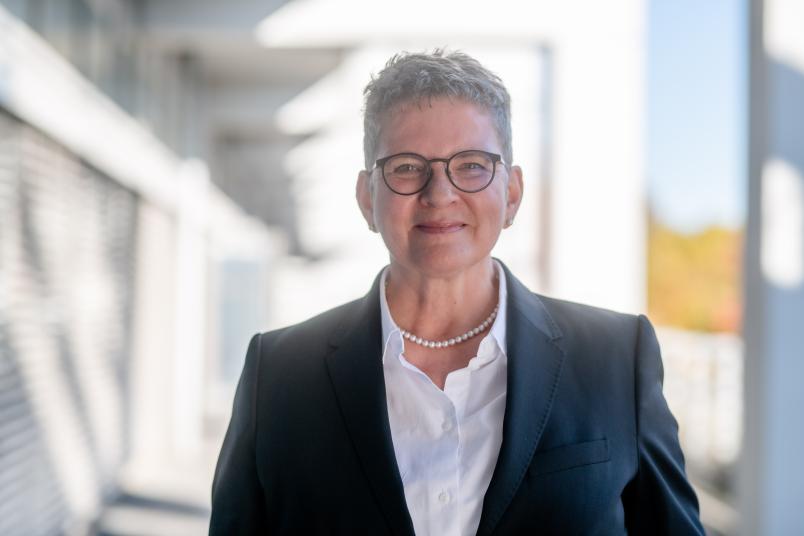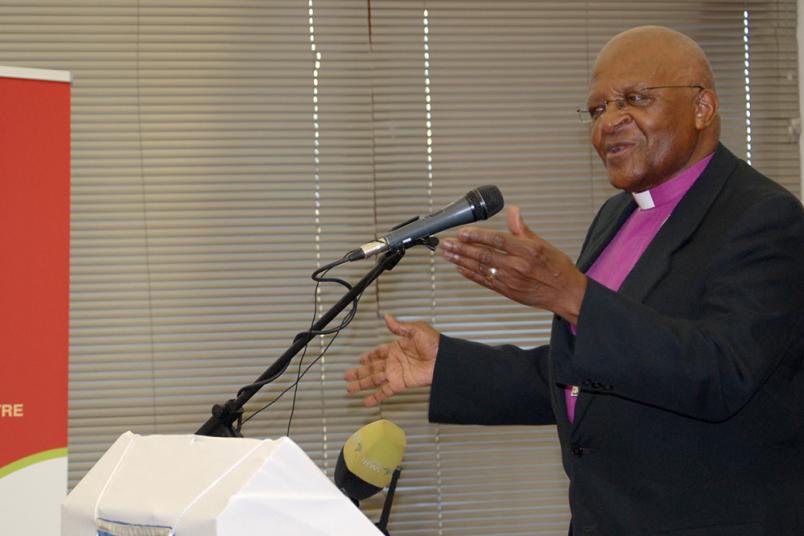More than just an obituary
Desmond Tutu – An inspiration for freedom and diversity
RUB not only had very close ties with the late Desmond Tutu, the university also feels deeply committed to his legacy – and that means embracing a diversity agenda!
Desmond Tutu was a remarkable person who stood up for diversity and freedom with great charisma, intelligence and vigour and fought every form of discrimination and exclusion in South Africa and worldwide. Ruhr-Universität is the only university in Germany to award him an honorary doctorate, and it did so in 1981 – even before Tutu became Archbishop and received the Nobel Peace Prize.
Theo Sundermeier, Professor Emeritus of Religious Studies and Intercultural Theology, campaigned strongly for Tutu’s honorary doctorate at the Faculty of Protestant Theology at the time. Sundermeier, who knew Tutu very well from his many years in Africa, was aware of how much German theology depends on impulses from African liberation theology, which Desmond Tutu represented.
In his struggle for the rights of black people, Desmond Tutu never allowed himself to be intimidated by the apartheid regime, even though the latter did a lot to achieve just that. When he was invited to Bochum to receive his honorary doctorate, he was refused permission to leave the country – despite the fact that the university appealed to both the then Foreign Minister Hans-Dietrich Genscher and the Minister President of North Rhine-Westphalia Johannes Rau to arrange for him to travel. Tutu prepared a speech which was read out by Ben Khumalo, a student from South Africa, at the award ceremony in the RUB auditorium. In this speech, Tutu outlined the theological reasons that moved him to fight against the racist regime in South Africa. Remarkably, he not only focused on the liberation of black people, but also perceived the oppressors to lack freedom, too. It was therefore no coincidence that Tutu became chairman of the Truth and Reconciliation Commission in South Africa in Nelson Mandela’s government after apartheid ended, and that he campaigned with great perseverance for peaceful reconciliation.
Awarding the doctorate after a 28-years delay
In 2009, Desmond Tutu finally received the honorary doctorate from the Faculty of Protestant Theology when the then Rector Elmar Weiler travelled to South Africa with Wilhelm Löwenstein to open a joint centre as part of the Ruhr-Universität’s cooperation with the University of the Western Cape. For Elmar Weiler, this trip was one of the highlights of his many years as rector. Presenting the certificate to Desmond Tutu in person was an unforgettable moment for him. Weiler writes: “Shaking hands with this great man and thanking him, experiencing his incomparable wit, his charisma, the radiance of his personality encourage me to this day. As long as such people are active, confidence will not fade.”
At that time, Ruhr-Universität, or rather the Institute for Development Research and Development Policy (IEE), headed by Wilhelm Löwenstein, set up a development research division at the Centre for Development Research and Criminal Justice in Cape Town, offering several Master’s and PhD programmes. Archbishop Tutu opened this South African-German centre in his capacity as Chancellor of the University of the Western Cape.
Not just a coincidental cooperation
The focus of the centre was on exploring the causes of growth deficits and unequal distribution of resources in developing countries. Wilhelm Löwenstein writes: “RUB didn’t choose the UWC as its most important African cooperation partner by chance. Unlike the University of Pretoria, the University of Witwatersrand, the University of Cape Town and the University of Stellenbosch, the UWC was one of the disadvantaged universities during apartheid. Therefore, the decision-makers at the time felt it was very fitting that RUB, as a reform university, should support the historically disadvantaged UWC in its development post-apartheid.” The RUB’s cooperation with the UWC dates back to the 1990s and expanded in the following years. The South African press showed great interest in the opening of the centre at the UWC. This was because Archbishop Desmond Tutu was expected to make an appearance, and he was known for always using his sermons as well as his public speeches to make digressions in which he criticised the South African government. These expectations were not disappointed. Desmond Tutu commended the academic cooperation between his UWC and the RUB, was obviously delighted to accept the honorary doctorate certificate in person after a delay of 28 years and to receive the laudation from Rector Weiler; and he then commented at length on the political corruption that was widespread in the Zuma government of the time. Accordingly, this resulted in considerable media response on the following day.
Encounters between Margot Käßmann and Desmond Tutu
Margot Käßmann, honorary professor at Ruhr-Universität, also recounts encounters with Desmond Tutu that made a lasting impression on her. In 1983, she was a youth delegate at the General Assembly of the World Council of Churches in Vancouver, where Desmond Tutu was invited to speak about the situation in his country. His arrival was delayed because there were again issues with travel out of the country. When he finally arrived, he didn’t go to the reception, as expected, but to the youth delegates’ meeting and told the young people about apartheid in his country. The second time Käßmann met Tutu was in the run-up to the first free elections in South Africa in 1994, when the situation there was very tense. It was anything but certain that the transition from the apartheid regime to democracy would succeed. Käßmann recounts how tirelessly Desmond Tutu preached non-violence. He said: “No one will be free unless all can live freely and without fear.”
Committed to the rainbow nation
Desmond Tutu was not only committed to opposing racism, but also to the rainbow nation, as he called his vision, where everyone lived peacefully together – black and white, people of different religions and backgrounds, straight and gay. When he presented a United Nations campaign for human rights and LGBT rights in 2013, he said with his characteristic wit: “I would not worship a God who is homophobic and that is how deeply I feel about this.” And he added: “I would refuse to go to a homophobic heaven. No, I would say sorry, I mean I would much rather go to the other place.” Such a statement was anything but a matter of course in the South-African church.
Committed to Tutu’s legacy
Ruhr-Universität is committed to the legacy of Desmond Tutu and his advocacy of diversity and freedom. As a reform university, it supports people who, due to their background, don’t take an academic education and career for granted. It aims at combating dynamics of discrimination and marginalisation at the place of work and study, and at supporting people who are underprivileged in different respects by nurturing their talents. Tutu’s legacy is also an enduring challenge for academic research – how do we envision development? How is reconciliation and forgiveness possible? What does freedom mean? How can we fight oppression? In this spirit, and in memory of Desmond Tutu, we strive for a universitas that not only promotes diversity but also embraces it as an enrichment – more than that: as an agenda.
Isolde Karle, Vice-Rector for Diversity, Inclusion and Talent Development at Ruhr-Universität Bochum

